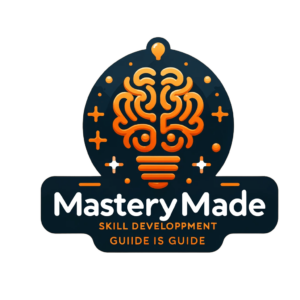As we journey through our career paths, we invariably encounter crossroads where the right advice and strategies make all the difference. We’re here to share some essential career advancement tips, professional development advice, and strategies for career success that are pivotal to elevating your professional journey. Our collective experience is channeled into helping you craft a career that doesn’t just grow, but thrives. From setting goals, embracing technology to fine-tuning your network, our guide is designed to be your ally in a relentless pursuit of career excellence.
Key Takeaways
- Effective goal setting is at the core of career advancement.
- Adopting savvy tech tools can streamline your path to professional growth.
- Professional networking opens doors to hidden opportunities.
- Continual learning and skill development are non-negotiable for staying relevant.
- Mentorship can provide guidance and accelerate your career trajectory.
- Your personal brand is your career’s signature – cultivate it with intent.
Identifying Your Career Goals
To achieve the professional success we all desire, it’s essential to begin with a clear understanding of our career objectives. In this section, we will explore strategies for setting actionable career goals, gaining insight into your industry’s hierarchy, and harmonizing your personal interests with your professional pursuits. Together, these approaches form a powerhouse of career growth strategies designed to put you on the fast track to advancement.
Set SMART Objectives for Career Growth
As experts in career advancement, we advise adopting the SMART criteria to refine your goals. This ensures that each objective you set is not only reachable but also has a significant impact on your progression. Let’s break down this framework:
- Specific: Clearly define what you want to accomplish, including the who, what, when, where, and why.
- Measurable: Determine how you will track your progress and measure success.
- Achievable: Ensure that while your goal is ambitious, it’s still attainable with the resources available to you.
- Relevant: Align your goal with broader career objectives to ensure it contributes to your overall growth.
- Time-bound: Set a realistic but firm deadline to help maintain focus and urgency.
Understanding the Career Ladder in Your Industry
Getting ahead in your profession requires familiarity with the typical career path in your field. By dissecting the career ladder, you can identify key job promotion techniques that apply specifically to your industry. This knowledge not only primes you for the next opportunity but also clarifies the necessary steps to get there.
| Industry | Entry-Level Position | Mid-Level Role | Senior-Level Role |
|---|---|---|---|
| Technology | Junior Developer | Project Manager | Chief Technology Officer |
| Healthcare | Nurse | Head Nurse | Healthcare Administrator |
| Finance | Bank Teller | Financial Analyst | Chief Financial Officer |
Aligning Personal Passions with Professional Goals
For a fulfilling career trajectory, it’s imperative to intertwine your personal passions with your professional targets. When your interests resonate with your work, the motivation to excel naturally surges. For us, this alignment has not only paved the way for success but also made the journey far more rewarding.
Building a Professional Network
In today’s rapidly evolving professional landscape, professional network building is a cornerstone of success. Our access to career advancement guidance, insights, and opportunities can significantly expand through the connections we make. By embracing networking and mentorship, we open up avenues for growth that are otherwise unavailable. Let us delve into the strategies that foster impactful professional relationships.
The Power of Networking and Mentorship
It’s a timeless truth that the relationships we forge can provide more than just companionship; they offer a reservoir of knowledge, support, and career advancement guidance that’s crucial in today’s competitive environment. A well-chosen mentor can illuminate our path with wisdom accumulated over years of experience, greatly influencing our professional trajectory. Networking isn’t just about expanding our contact list—it’s about cultivating meaningful partnerships that grow over time.
Leveraging Social Media for Career Connections
Platforms like LinkedIn transcend the traditional boundaries of networking, allowing professionals to connect across the globe. By actively engaging on such platforms, we leverage them not only to stay connected but also to showcase our expertise, engage in industry conversations, and align with thought leaders. In effect, we transform social media into a dynamic tool for professional network building.
| Strategy | Benefits | Action Steps |
|---|---|---|
| Attend Industry Conferences | Meet peers, leaders, and potential mentors; stay updated on industry trends. | Register for events, prepare questions, and follow-up with connections. |
| Join Professional Groups | Access to niche communities; peer-to-peer learning and support. | Identify relevant groups, actively participate, and contribute value. |
| Engage on LinkedIn | Build visibility; engage with content from leaders and potential mentors. | Optimize your profile, share insights, comment thoughtfully on discussions. |
As we continue to expand our professional circles, remember that the essence of successful networking lies in mutual benefit and genuine interaction. With the right approach, our network can become our most valuable asset, providing mentorship and opportunities that are integral to career progression.
Developing Essential Skills for Career Progression
As the workforce landscape continuously shifts, it’s paramount for professionals to adapt by honing skills that facilitate career progression. We’re here to provide you with actionable professional development advice that revolves around enhancing both technical proficiencies and interpersonal abilities. Whether you’re an emerging professional or a seasoned expert, these insights will bolster your career advancement efforts.
Hard skills are quantifiable and often require specific training; they range from proficiency in new software to advanced certification in your field. Soft skills, on the other hand, are the interpersonal attributes that enable you to navigate the professional environment effectively—they’re about how you work just as much as what you work on. Both skill sets are essential skills for career advancement and are highly prized by employers worldwide.
| Essential Hard Skills | Essential Soft Skills |
|---|---|
| Data Analysis | Communication |
| Technical Writing | Problem-Solving |
| Project Management | Leadership |
| Foreign Language Proficiency | Adaptability |
| Computer Programming | Teamwork |
| SEO/SEM Marketing | Critical Thinking |
To stay competitive, we encourage you to identify gaps in your capabilities and relentlessly pursue improvement – perhaps through online courses, attending workshops, or even returning to higher education. It’s never too late to add another string to your bow and become the multifaceted professional that today’s job market demands. Let us not forget, your growth is an ongoing process, and your journey towards excellence is everlasting.
Remember, our career progression tips are designed to guide you, but your personal initiative plays a critical role in mastering these skills. Take ownership of your development, and be proactive in seeking opportunities to sharpen your abilities. Your future self will thank you for the investment you make today.

Mastering the Art of Self-Promotion
In today’s competitive landscape, self-promotion in career is not merely an option—it’s a necessity. But to do it right, one must strike a delicate balance between confidence and humility. As we embark on this journey, let’s first focus on building a compelling personal narrative.
Crafting Your Personal Brand
Creating a strong personal brand is akin to telling a story. This story is about you—the protagonist who possesses unique skills, values, and experiences worth sharing. It’s about consistently projecting your professional identity and making an impression that lasts. How do you want to be remembered when you leave the room? Let’s explore the critical elements that define a captivating brand:
- Your professional ethos: What principles guide your work?
- The unique skills you bring to the table: What can you do better than others?
- The value you offer: How do your contributions make a difference?
- Your visual identity: Does your professional style reflect your brand?
Effective Communication of Achievements and Aspirations
It’s essential to share your successes and goals in a way that resonates with your audience. Whether you’re at a networking event, speaking with a superior, or interacting with peers, the art of communicating achievements requires a blend of authenticity and strategy. Here are some techniques to consider:
| Achievement Type | Communication Method | Expected Outcome |
|---|---|---|
| Professional Milestones | Personal storytelling with concrete data | Establish credibility and showcase growth |
| Leadership Initiatives | Discussions on team dynamics and project management | Highlight leadership and team-building skills |
| Educational Advancements | Sharing certifications or continued education endeavors | Demonstrate dedication to professional development |
| Innovative Solutions | Case studies or success stories | Emphasize problem-solving and innovation capabilities |
Remember, in the process of advancing your career, strategic self-promotion is not just about visibility but about making impactful connections that pave the way for future growth and opportunities.
Navigating the Path to a Job Promotion
Embarking on the journey to a coveted job promotion requires a keen understanding of the landscape. It’s not only about the work you do but also about understanding deeply what employers look for in potential candidates. Are you showcasing the right qualities? Are you aligning your achievements with the company’s vision? We’re here to explore and answer these pivotal questions.
Understanding What Employers Look for in Promotion Candidates
Employers aren’t just searching for someone who can tick off all the items in a job description. They seek individuals who demonstrate exceptional qualities that align with long-term organizational goals. Having a proactive mindset, keen problem-solving skills, and the capacity to lead are among the traits that paint the picture of an ideal candidate for advancement. Let’s dive into what distinguishes a promotable employee:
- Leadership Potential: Exhibiting the ability to guide others and inspire a shared vision for success.
- Results-Driven Achievements: A track record of measurable outcomes that have positively impacted the company.
- Adaptability: Flexibility in adapting to new challenges and changing environments.
- Commitment to Growth: A demonstrated investment in professional development and continuous learning.
Proactive Steps Toward a Job Promotion
Advancing in your career necessitates a proactive approach, one that shows you’re ready to take on increased responsibilities and elevate your game. Below is a robust table delineating the proactive steps you can take to set yourself apart and climb that career ladder:
| Action | Impact | Visibility |
|---|---|---|
| Volunteer for New Projects | Highlights your initiative and willingness to tackle challenges. | Raises your profile within various departments. |
| Continuous Skill Development | Keeps you at the forefront of industry trends and practices. | Positions you as a subject matter expert amongst peers. |
| Seek Feedback | Allows for growth and shows openness to improvement. | Conveys your dedication to professional excellence. |
| Mentorship and Networking | Develops leadership skills and builds strategic connections. | Expands your sphere of influence beyond your immediate team. |
| Understand the Business | Provides insight into strategic decisions and company objectives. | Demonstrates a vested interest in the organization’s success. |
Remember, the art of effective self-promotion and showcasing your job promotion techniques can be subtle yet impactful. We believe in your potential to grow and flourish. By employing these strategies and understanding what employers look for, you’re not just waiting for opportunities — you’re actively creating them. Here’s to advancing in your career and unlocking new horizons of professional achievement.
Optimizing Your Resume and Online Presence
We understand the importance of making an impactful first impression. In today’s digital age, optimizing your resume and online presence for career advancement is not just a recommendation; it’s a necessity. Whether it’s for networking, searching for new opportunities, or professional branding, a polished online profile and resume are your front-line arsenal in the job market. Let’s dive into some key strategies to enhance your professional image and catch the eye of future employers.

Firstly, start with your resume. It’s crucial to tailor it to highlight your most valuable experiences and skills. Ensure all information is up-to-date, and don’t shy away from using industry-relevant keywords. A visually pleasing format combined with clear, concise language makes your resume not only readable but memorable.
- Conduct a thorough audit of your professional platforms such as LinkedIn.
- Regularly update your profile with recent achievements or certifications.
- Engage with content related to your industry to increase visibility.
- Request endorsements and recommendations to bolster credibility.
Remember, your professional development advice doesn’t stop at what you present online. It extends to continuous self-improvement and keeping abreast of the latest trends in your field. We urge you to invest in yourself, always striving to be the standout candidate in any career opportunity that may arise.
By employing these tips, you’re not just optimizing your resume, but also manifesting an online presence that’s primed for career advancement. It’s a vital step in your journey of professional development. A carefully managed digital persona reflects a candidate who is meticulous, tech-savvy, and proactive—an ideal profile for the modern professional.
Utilizing Feedback for Personal and Professional Development
We’ve all encountered feedback at some point in our careers. But the real question is, how can we utilize this feedback to fuel our personal and professional development? The answer lies not just in receiving feedback but in actively seeking it, evaluating it critically, and implementing the advice to foster growth.
Embracing Constructive Criticism
When it comes to professional growth, embracing constructive criticism is a powerhouse move. It’s not always an easy pill to swallow, but by **welcoming critiques** with an open mind, we pave the way for invaluable insights and learning opportunities. Think of it as a puzzle; each piece of feedback helps complete the picture of who you can become professionally.
Remember, criticism is not a sign of failure but a stepping stone to success.
Setting Up Regular Performance Reviews
Regular performance reviews aren’t just a formality; they’re a cornerstone of career advancement. They offer a structured opportunity to discuss achievements, pinpoint areas for improvement, and set tangible goals for the future. These reviews are a two-way street, providing space for dialogue and fostering a clear path for professional development.
| Feedback Type | Benefits | Action Steps |
|---|---|---|
| Skills Assessment | Identifies strengths and areas needing improvement | Enroll in targeted training or workshops |
| Peer Review | Offers diverse perspectives on performance | Collaborate more closely with colleagues |
| Self-Evaluation | Encourages self-reflection and responsibility | Set personal objectives for growth |
| Client Feedback | Highlights service delivery and client satisfaction | Implement changes to improve client experience |
| Managerial Review | Aligns performance with company goals | Create a roadmap for career progression with clear milestones |
By utilizing feedback, we not only gain insights into how others perceive us but also hold a mirror to our own performance. This dual lens is crucial for anyone invested in their personal and professional development—coupled with an appetite for embracing constructive criticism, you’re setting the stage for a thriving career that is ever-evolving and responsive to the tidal waves of change.
Investing in Continuous Education and Training
In today’s dynamic job market, the pursuit of continuous education and training is not just advantageous; it’s essential. We are committed to guiding professionals like you through effective career growth strategies and providing comprehensive professional development advice. Join us in exploring how continued learning can become the cornerstone of your career success.
Whether it’s expanding your skillset with new certifications, pursuing higher education, or engaging in workshops, these learning opportunities can lead to significant advancements in your career. By integrating continuous education into your professional life, you’re bound to stay ahead of the curve. Let’s dive into the myriad of benefits that come with an unwavering dedication to learning and growth.
- Broadening your expertise to stay relevant in your current role
- Opening doors to new career opportunities and challenges
- Solidifying your value to potential employers with up-to-date skills
- Fostering innovation and creative thinking through fresh knowledge
- Boosting job satisfaction and confidence in your professional capabilities
Remember, the investment in your education is the most profound investment in your career. It paves the way for lifelong achievement and fulfillment.
Let us commit to a future where our professional growth never plateaus. Together, we’ll embrace the changes and demands of the global marketplace with the power of education and continuous personal development.
Achieving Work-Life Balance for Long-Term Success
We all strive for a harmonious blend of a successful career and a fulfilling personal life. The key to achieving work-life balance involves integrating long-term success strategies in our careers while also prioritizing time management. Let’s explore the avenues that help in attaining this equilibrium, which is essential for not only professional growth but also for personal happiness and well-being.
Prioritizing Time Management
Effective time management is the cornerstone of a balanced life. By organizing our schedules, setting priorities, and sticking to our goals, we ensure that each area of our lives receives the attention it deserves. Let’s consider some time management techniques that can support us in our quest for balance:
- Set clear priorities and say no to tasks that do not align with them.
- Delegate tasks to others when possible, leveraging teamwork for greater efficiency.
- Make use of digital tools and apps designed to streamline workflows and reduce time wastage.
Adhering to these strategies can lead to a productive work environment and a more manageable personal schedule, enabling us to allocate time for relaxation and pursuits that enrich our lives outside of work.
The Importance of Taking Breaks and Vacation Time
Never underestimate the regenerative power of taking a breather. Studies confirm the benefits of stepping away from the daily grind to rejuvenate our minds and bodies.
Taking regular breaks and vacation time is proven to boost productivity and focus, as well as enhance overall job satisfaction and creativity.
Here are some insights into how taking breaks and vacation can contribute to achieving work-life balance and promote a thriving professional path:
| Benefits of Taking Breaks | Benefits of Vacation Time |
|---|---|
| Increases immediate productivity and performance. | Reduces job stress and prevents burnout. |
| Enhances creativity by allowing the mind to wander. | Improves mental health and well-being. |
| Improves concentration and focus for continued work. | Provides an opportunity for family bonding and personal growth. |
| Encourages physical movement, helping to maintain health. | Leads to increased post-vacation work performance. |
Embracing these practices is integral not only to our personal satisfaction but also to our career longevity. By achieving work-life balance, we set ourselves up for a rewarding and sustainable career trajectory.
Understanding Company Culture and Advancement
We’ve all heard it said: to move ahead in your career, it’s not just about what you know, but also how you fit within the company culture. As we delve into strategies for career success, one aspect that often goes overlooked is the importance of understanding company culture. This isn’t just about adhering to dress codes or knowing when and where meetings are held—though those are certainly part of it. It’s about the nuanced interplay of values, practices, and social norms that make up the everyday life within an organization.
Grasping these subtleties allows for a smoother integration into the team and can facilitate more impactful interactions with colleagues and decision-makers. It’s one of the critical career advancement tips that has the potential to open more doors than any technical skill or certification might. For example, recognizing the importance of collaboration over competition in a company that values teamwork can significantly enhance your working relationships and your reputation within the firm.
Ultimately, the strategies for career success are as much about perception and interpersonal relationships as they are about competence and results. By investing time to understand company culture, we align our behaviors and attitudes with what’s celebrated and respected within our workplace. This alignment not only increases our job satisfaction but also positions us conspicuously along the path of advancement opportunities. The culture of a company can be a roadmap to success when navigated thoughtfully and with intention.
FAQ
How can I effectively set career goals to advance professionally?
To set effective career goals, employ the SMART objectives framework which emphasizes that goals should be Specific, Measurable, Achievable, Relevant, and Time-bound. This approach provides clarity and a definitive path towards your career growth.
What steps should I take to understand the career ladder in my industry?
To understand the career ladder in your industry, research and network with industry professionals. You could also consult with mentors or advisors, and review job descriptions to get insight into the qualifications and experience needed for advancing roles.
How can I align my personal passions with my professional goals?
You can align your personal passions with your professional goals by identifying what you are passionate about and exploring roles or projects in your field that match these interests. This alignment can lead to greater satisfaction and motivation in your career.
What are the benefits of having a professional network and how can I build one?
A professional network provides access to new opportunities, insights into industry trends, and potential mentorship. Build your network by attending industry events, connecting on professional social platforms like LinkedIn, and participating in professional organizations related to your field.
How can I develop essential skills for career progression?
Develop essential skills by staying updated with industry trends, seeking out training and education, volunteering for new projects, and practicing both hard (technical) and soft (people) skills that are in demand in your field.
What is the importance of crafting a personal brand for career advancement?
Crafting a personal brand is important for career advancement as it helps you to stand out and be remembered by potential employers and colleagues. It communicates your unique skills, values, and experiences, and establishes your reputation in the professional world.
What should I consider for effective self-promotion and communicating achievements?
For effective self-promotion, consider highlighting quantifiable achievements, sharing success stories, and expressing your career aspirations confidently. Tailor your message to your audience and select the appropriate platform for sharing.
How can understanding what employers look for help me in a job promotion?
Understanding what employers look for helps you to tailor your development towards those traits and achievements. Demonstrate your ability to exceed in your current role and show potential for handling the responsibilities of the next level.
What are proactive steps toward a job promotion?
Proactive steps toward a job promotion include taking on added responsibilities, continuously improving your skills, offering innovative solutions, and clearly communicating your career aspirations with your superiors.
Why is it important to optimize my resume and online presence?
Optimizing your resume and online presence is vital as they serve as your first impression to potential employers and can significantly affect your visibility and credibility in the professional community. Keeping them current and reflective of your skills and achievements can open new doors for advancement.
How can I utilize feedback for my professional development?
Utilize feedback by actively seeking out and listening to constructive criticism, using it to make informed decisions about your personal and professional growth. Regularly reflect on this feedback and incorporate it into your development plans.
What is the significance of continuous education and training in my career?
Continuous education and training are crucial as they enable you to stay current with new industry knowledge, acquire advanced skills, and demonstrate a commitment to personal and professional excellence to employers.
How does achieving work-life balance contribute to long-term career success?
Achieving work-life balance is key to maintaining long-term productivity and health. It prevents burnout, keeps you motivated and allows you to focus and perform better in your professional life while enjoying personal fulfillment.
How can understanding company culture aid in career advancement?
Understanding company culture aids career advancement by helping you to navigate the workplace dynamics, build better relationships with colleagues, and position yourself as a cultural fit, which is often crucial for promotion considerations.











